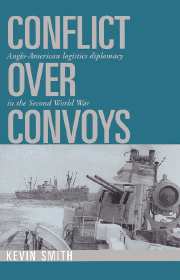Book contents
- Frontmatter
- Contents
- List of maps
- List of tables
- Preface
- List of abbreviations and codewords
- Introduction
- 1 “Not what it could or should be”: Britain's shipping situation
- 2 “Beyond our power without your help”: Britain's Battle of the Atlantic
- 3 “But westward, look, the land is bright”: American shipping assistance from neutrality to belligerency, March 1941–November 1942
- 4 Roosevelt's promise: “your requirements will be met”
- 5 The Casablanca Conference and its aftermath: a “most curious misunderstanding”
- 6 Reaping the whirlwind: the perils of impending victory
- Postscript and conclusions
- Appendices
- Tables
- Notes
- Bibliography
- Index
5 - The Casablanca Conference and its aftermath: a “most curious misunderstanding”
Published online by Cambridge University Press: 06 July 2010
- Frontmatter
- Contents
- List of maps
- List of tables
- Preface
- List of abbreviations and codewords
- Introduction
- 1 “Not what it could or should be”: Britain's shipping situation
- 2 “Beyond our power without your help”: Britain's Battle of the Atlantic
- 3 “But westward, look, the land is bright”: American shipping assistance from neutrality to belligerency, March 1941–November 1942
- 4 Roosevelt's promise: “your requirements will be met”
- 5 The Casablanca Conference and its aftermath: a “most curious misunderstanding”
- 6 Reaping the whirlwind: the perils of impending victory
- Postscript and conclusions
- Appendices
- Tables
- Notes
- Bibliography
- Index
Summary
It was no use suggesting that we could assist the Americans with “BOLERO” when we were forced to ask them for assistance for the import programme. Once we were assured of a United Kingdom import of 27 million tons in 1943 the allocation of any surplus shipping could be considered, but not until we had reached that point.
Diary of F.H. Keenlyside, Leathers' Private Secretary, for 17 January 1943Lord Leathers made certain commitments to General Somervell at the Casablanca Conference with regard to British assistance in our efforts to build up forces during 1943 in the United Kingdom. Plans for 1943 operations are being based on the fulfillment by the British of these commitments. It is our intention to press for definite scheduling of the cargo shipping and troop lift promised.
ASF General C. P. Gross to Douglas, 27 February 1943British imports cannot be reduced by a single ship. The February imports are frightful, and the inroad on stocks is such that a halt must be called.
Winston Churchill, 1 March 1943Britain's reliance on President Roosevelt for rescue from its global logistical shortfalls threatened to fracture the Anglo-American alliance. His haphazard management of American logistical choices ensured an ugly convergence of strategic recklessness and logistical ignorance and duplicity at the Anglo-American strategic conference in Casablanca in January 1943.
- Type
- Chapter
- Information
- Conflict over ConvoysAnglo-American Logistics Diplomacy in the Second World War, pp. 133 - 176Publisher: Cambridge University PressPrint publication year: 1996



